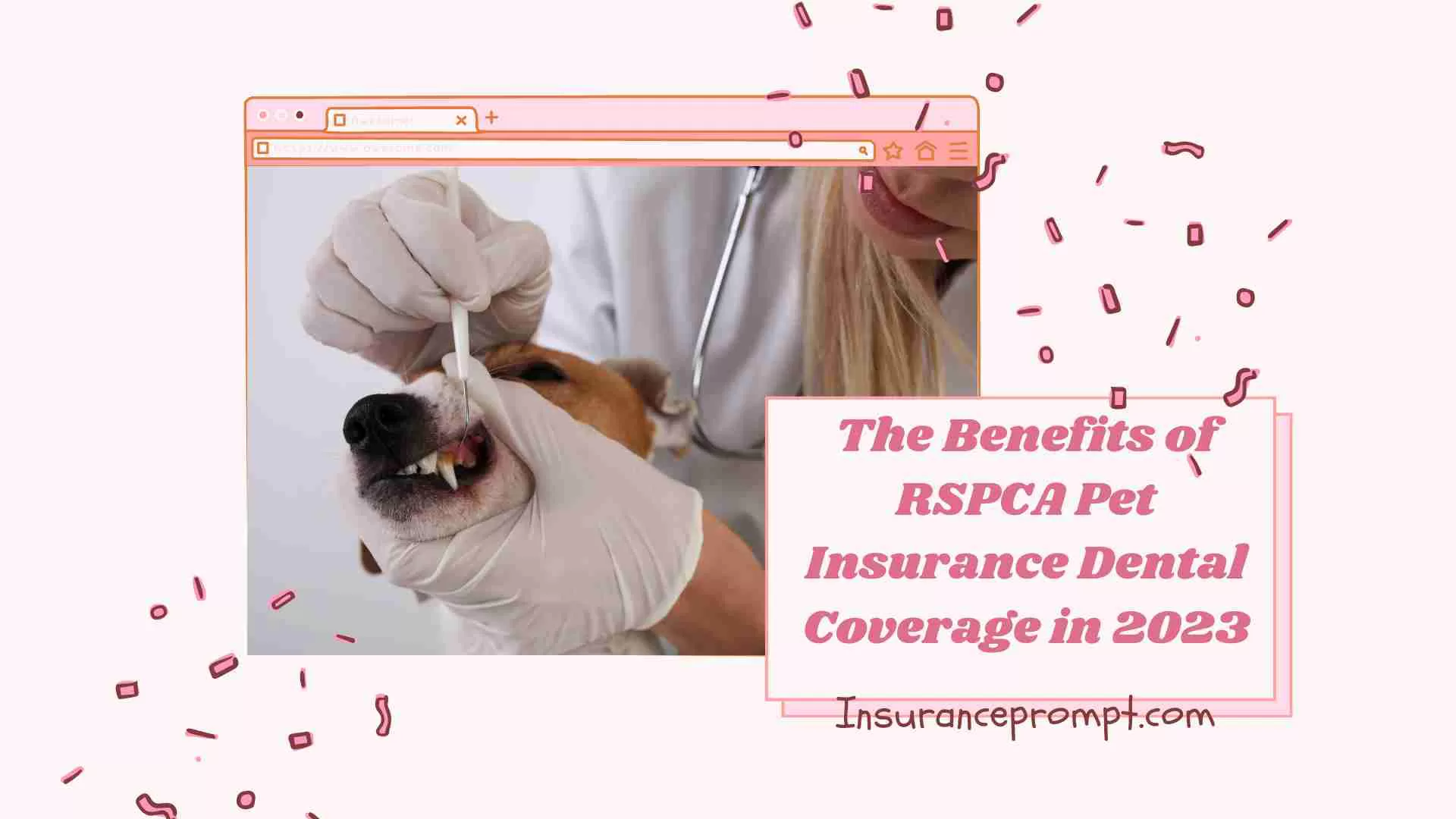RSPCA Pet Insurance, offered by the Royal Society for the Prevention of Cruelty to Animals, is one option to consider if you and your pet are looking for coverage that includes dental care.
You can relax knowing that a reputable and trustworthy supplier with RSPCA Pet Insurance is covering your pet’s dental treatment.
We’ll delve more into the benefits of the RSPCA Pet Insurance dental plan in this blog post.
Table of Contents
What is Pet Insurance?
Pet insurance is a type of health plan that pet owners can pay monthly or annually in exchange for reimbursement of eligible veterinary expenses. It can help offset some of the costs associated with a pet’s health care and provide payment or reimbursement for specific health expenses covered by the policy.
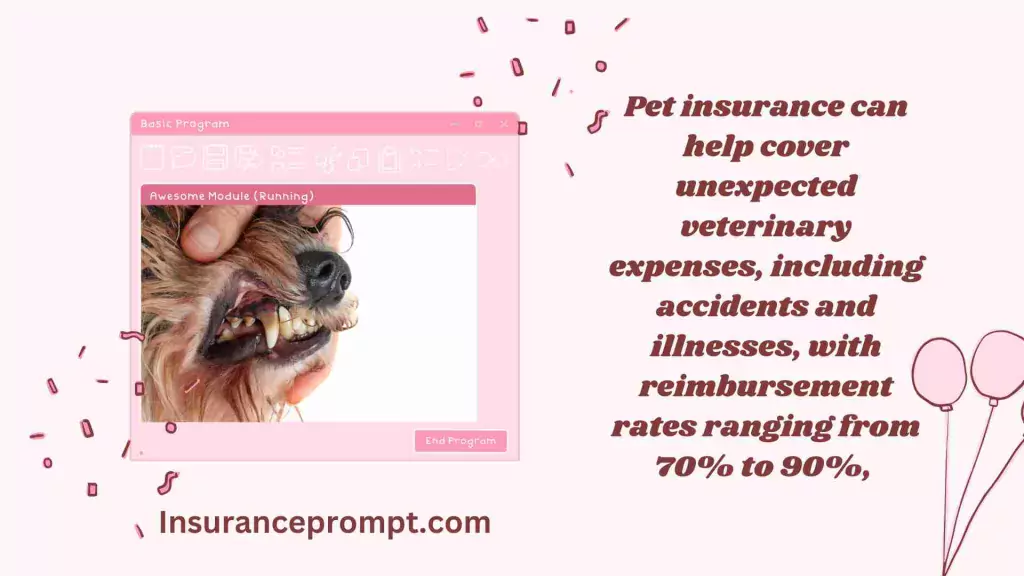
Pet insurance can reimburse you for eligible veterinary expenses, particularly if your pet suffers an unexpected accident or illness. Depending on the pet insurance company and policy, coverage for elective and preventive procedures may also be offered.
Pet insurance works similarly to human health insurance, with different levels of coverage available for a monthly or annual premium based on how much coverage you choose. Pet insurance policies reimbursement rates and annual limits vary between providers, with some companies offering maximum annual coverage of up to $50,000 and reimbursement rates between 70% to 90%.
It’s crucial to remember that pet insurance may not pay for normal treatment or pre-existing conditions because it’s intended to cover unforeseen expenses.
Considering $5,000 in coverage, a $250 deductible, and a 90% reimbursement rate, the average yearly cost of pet insurance is $420 for dogs and $336 for cats.
Where Can I Get Pet Insurance?
Several places offer pet insurance, including insurance firms, veterinarian clinics, and internet pet insurance providers. It’s important to compare policies and choose one that best suits your pet’s specific needs.
If you’re seeking RSPCA-affiliated pet insurance that includes dental care, you might be interested in learning more about the dental coverage add-on choices for RSPCA Pet Insurance.
While their annual benefit limit of $20,000 could be more market-leading, their policies offer up to 80% reimbursement for medically necessary veterinary treatments prescribed to treat your pet’s covered conditions, including dental care.
RSPCA Pet Insurance is issued by The Hollard Insurance Company and distributed and promoted by Greenstone Financial Services Pty Ltd (GFS) and its Authorised Representative (AR), RSPCA Australia. It is arranged and administered through PetSure (Australia) Pty Ltd.
It’s worth noting that many insurance companies, including RSPCA Pet Insurance, offer additional coverage options, such as well-visit benefits or dental coverage, as add-on options to your plan. The breed of your pet and its age are two variables that affect the pet insurance price.
For example, the average cost for Spot pet insurance, which offers $5,000 of annual coverage, a $250 deductible, and an 80% reimbursement rate, is $45 a month, according to a Forbes Advisor analysis of pet insurance costs.
When it comes to filing a claim, most pet insurance companies let you do it online by either requesting your veterinarian to do so using an electronic pet insurance claim (eClaim) for reimbursement or by filing the claim yourself.
You can also submit your claim by mail, though doing so will require you and your veterinarian to fill out and sign the claim form, adding time to the process.
Before purchasing, you must be aware of what is covered in your pet insurance policy. Accidental poisoning and swallowed objects are common accidents that pet insurance policies typically cover, with the yearly cost for accident-only coverage averaging $194 for dogs and $126 for cats as of 2019.
It’s important to remember that rabies in pets cannot be treated, but a vaccine can provide protection.
Which Pets Are Eligible?
According to the details provided on the RSPCA Pet Insurance website, coverage is available for cats and dogs as young as eight weeks of age, depending on the level of coverage you select, and as old as sixteen.
. RSPCA Pet Insurance covers cats and dogs for specified accidental injuries and illnesses and offers four levels of flexible cover.
Depending on the level of cover selected, you could claim up to $20,000 a year and get back up to 80% of eligible vet bills with no excess to pay. Once your dog or cat is accepted, you can continue to cover them for life. RSPCA Pet Insurance also offers lifelong coverage if you continue to renew your policy with them.
This means that RSPCA will cover your pet until they pass on. It is important to note that RSPCA pet insurance costs depend on several factors, such as your pet’s breed, age, and address.
Why is It Important for Australians to get RSPCA Pet Insurance Dental Coverage
RSPCA Pet Insurance covers a range of accidental injuries and illnesses for dogs and cats. However, dental coverage is not explicitly mentioned as one of the covered benefits. Nevertheless, Australian pet owners must consider obtaining pet insurance for their furry friends for various reasons, including unexpected injuries from road vehicles, common ailments, and threats unique to the Australian environment.
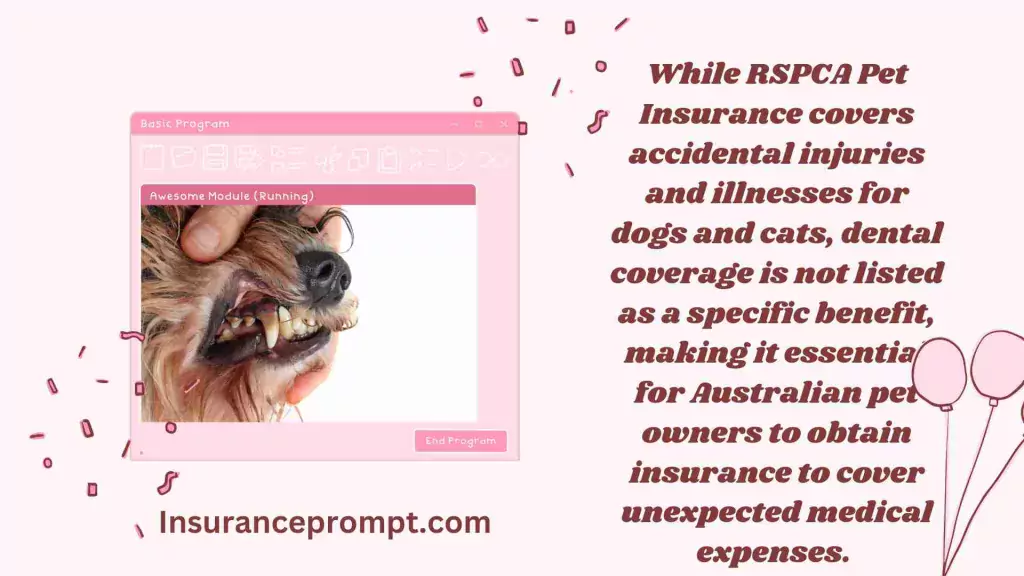
Because pet ownership is a long-term commitment that can last up to 20 years, having pet insurance helps ensure that pets get the necessary medical treatment, including dental care, throughout their lifetimes.
Additionally, pet insurance helps lessen the financial pressure from unforeseen medical expenses, such as expensive dental work.
RSPCA Pet Insurance is issued by The Hollard Insurance Company Pty Ltd and distributed and promoted by Greenstone Financial Services Pty Ltd. Its Authorised Representative is RSPCA Australia, with administration through PetSure (Australia) Pty Ltd.
What Type of Dental Coverage is Included In Rspca Pet Insurance?
According to the FAQs on the RSPCA Pet Insurance website, dental coverage is included under the accidental injury section of the policy. It is important to review the policy details and speak with a representative to fully understand RSPCA Pet Insurance’s dental coverage.
Are Teeth cleaning Covered by Rspca Insurance Dental Coverage?
RSPCA Pet Insurance offers teeth cleaning coverage as part of their optional Routine Care coverage plan. Routine Care coverage provides coverage for a range of preventative healthcare treatments such as teeth cleaning, desexing, and vaccinations. However, it’s important to note that coverage for teeth cleaning may be subject to limits and certain conditions.
For example, Pets Best dental coverage requires pets to be free of all dental diseases at the time of enrollment and to have had teeth cleaning in the last 13 months under general anesthesia if over the age of 3. Additionally, many dental procedures, including aesthetic, endodontic, or orthodontic procedures as well as routine dental examinations and cleanings, can not be covered by pet insurance plans.
How Often Can I Use My Rspca Pet Insurance for Dental Care?
With RSPCA Pet Insurance, you can claim dental care up to four times a year. This coverage includes cleaning, extractions, fillings, and more. Depending on the plan you select, a co-payment might be necessary. Unfortunately, pre-existing dental conditions are not covered.
Regular check-ups and preventive care can help maintain your pet’s dental health. With RSPCA Pet Insurance, you can have peace of mind knowing that your pet’s dental care is covered. With coverage for up to four visits a year, you can have the assurance that their dental needs are taken care of. Get the protection you require to keep your pet content and healthy.
Is There an Age Limit for Rspca Pet Insurance Dental Coverage?
RSPCA pet insurance does have age limits for pets. Policies can be taken out for pets as young as 8 weeks old and up to their ninth birthday. For pets over 9 years but before they reach 16, the cover has annual condition limits and reimburses a maximum of 60% of approved veterinary bills.
While pet dental insurance is not a typical offering, some pet insurance plans do cover dental care through comprehensive and routine/preventative care coverage. Comprehensive plans typically cover accidents and illnesses, so care for dental-related accidents and illnesses should be covered unless there are dental exclusions to the plan’s coverage.
Pets Best covers periodontal disease for pets aged 3 and older as long as a teeth cleaning was completed in the previous 13 months under general anesthesia and there were no signs or symptoms of dental disease.
What Does Pet Insurance Not Cover?
Heir Accident Only policy covers dental treatment, although the specific treatments will depend on your chosen policy. However, the website does not provide information about what dental treatments are excluded from coverage. For more details, it is recommended to contact RSPCA Pet Insurance directly.
That being said, other sources provide general exclusions for pet dental insurance coverage. Cosmetic, endodontic, or orthodontic services such as caps, implants, and filings are usually not covered, as well as routine teeth cleanings. Pet insurance typically doesn’t cover anything related to breeding, pregnancy, or birth care for pets, and pre-existing conditions are usually not covered.
What is the Cost of Rspca Pet Insurance for Dental Coverage?
Owning a pet may be costly, particularly when unplanned medical expenses arise.
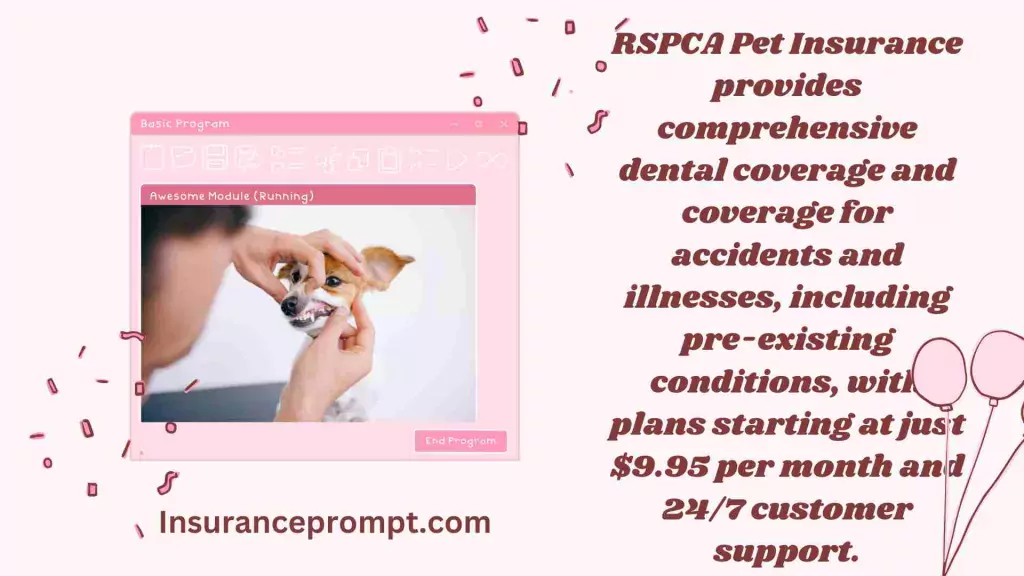
Fortunately, RSPCA Pet Insurance offers comprehensive dental coverage to help you protect your pet’s teeth. Plans start as low as $9.95 per month and provide reimbursements for dental check-ups, cleanings, extractions, and other necessary treatments.
RSPCA Pet Insurance also offers coverage for accidents and illnesses that can help you protect your pet from unexpected vet bills. Plus, they cover pre-existing conditions as long as they were not symptomatic prior to enrolling in the policy.
RSPCA Pet Insurance offers a 24/7 customer support line to assist you with any queries you may have regarding coverage. This enables you to seek assistance whenever you require it.
RSPCA Pet Insurance is a great way to make sure your pet’s dental needs are taken care of, as well as any unexpected illnesses or injuries. You can be confident that your pet will be covered with plans starting as low as $9.95 per month and a 24/7 customer support line.
Does Rspca Pet Insurance Cover Pre-existing Dental Conditions?
RSPCA Pet Insurance is a terrific choice for pet owners who wish to provide their furry pets the best care possible. Unfortunately, pre-existing dental conditions—those that were identified before enrolling in the plan—are not covered.
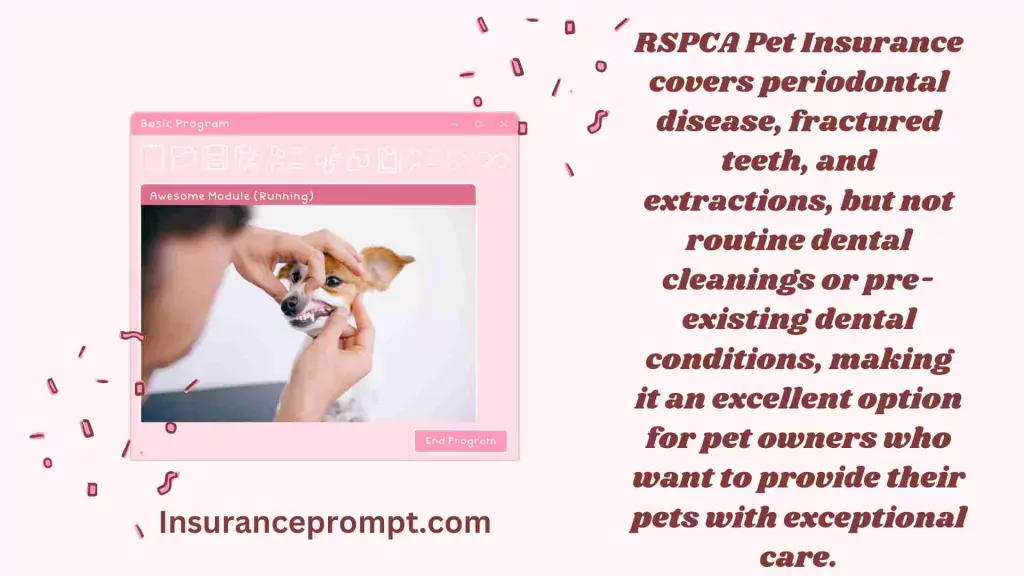
However, it does cover treatments for some dental issues, such as periodontal disease, fractured teeth, and extractions.
You should know that RSPCA Pet Insurance does not cover routine dental cleanings.
Knowing what is and is not covered by RSPCA Pet Insurance if you are considering registering your pet is crucial.
Contact the RSPCA Pet Insurance help desk if you have concerns about your pet’s dental care being covered. They will have the most up-to-date information on coverage and any potential exceptions. The RSPCA Pet Insurance program can help you give your pet the attention it deserves.
Frequently Asked Questions
What is the Waiting Period for Pet Insurance?
The waiting period for RSPCA Pet Insurance Dental depends on the type of coverage you purchase. Most pet insurance policies have a 14-day waiting period for coverage of injuries and illnesses, but 30 to 90 days for dental care.
If you purchase RSPCA Pet Insurance Dental, make sure to check the terms and conditions to determine the exact waiting period for your policy.
Can You Get Pet Insurance for Rabbits?
Yes, it is possible to get pet insurance for rabbits.
You can rest easy knowing that your rabbit will enjoy optimal health thanks to the comprehensive dental coverage offered by the RSPCA Pet Insurance plan.
Everything from preventative care to after-hours medical attention is covered under the plan, and it’s reasonably priced.
With the RSPCA Pet Insurance Dental plan, you can rest assured that your rabbit will receive the best possible care and protection. But in some places like Brisbane, it is not legal to keep Rabbits.
When Will My Policy Start and When Can I Claim?
Your RSPCA pet insurance policy will start immediately after purchase. You can make a claim as soon as your pet is diagnosed with a dental condition covered by your policy. It is critical to keep in mind that you cannot submit a claim for pre-existing ailments, so you should thoroughly review the policy terms to ensure that your needs are met.
Which Pet Insurance Covers Everything?
No pet insurance policy covers everything. In general, pet insurance coverage does not cover pre-existing conditions. Your pet’s pre-existing conditions won’t be covered by the insurance plan.
It’s critical to pick insurance that meets the unique needs of your pet because different policies provide various coverage possibilities.
Will Pet Insurance Cover Existing Conditions?
Unfortunately, RSPCA Pet Insurance will not cover existing conditions. Since existing conditions are pre-existing medical issues, they are not included in the pet insurance coverage. In order to prevent any long-term medical problems, pet owners should take special care to give their animals the required preventative care. Regular check-ups and vaccinations are essential for keeping your pet healthy and avoiding any costly medical bills from treating existing conditions.
Can Pet Insurance Cover Cataract Surgery?
Yes, pet insurance can cover cataract surgery. Pet insurance companies, such as RSPCA, may offer coverage for cataract surgery, depending on the plan. With RSPCA pet insurance, you can customize your plan to fit your pet’s needs, and therefore determine if cataract surgery is covered. If you think your pet may acquire cataracts, you should get insurance that will pay for the procedure.
With RSPCA pet insurance, you can also get coverage for your pet’s dental care, so you can rest assured that your pet’s teeth and eyes are taken care of.
What Pet Insurance Covers Dental?
Several pet insurance providers offer coverage for dental procedures, including procedures for dental injuries, tooth extractions, root canals, and gum diseases. There are pet insurance policies that cover luxating patella, but coverage may depend on the severity of the condition and whether it existed before the policy start date.
What Pet Insurance Covers Luxating Patella?
RSPCA Pet Insurance covers luxating patella, a condition in which the kneecap slides out of its normal position. Luxating patella can cause pain and lameness in dogs, and can require expensive surgery. With RSPCA Pet Insurance, owners can be sure that their pet’s luxating patella is covered for any necessary treatment. RSPCA Pet Insurance also covers dental treatment, which is essential for keeping a pet’s teeth healthy. The policy covers both preventive care and emergency dental treatments, so pet owners can rest assured that their pet’s dental needs are taken care of.
How is RSPCA pet insurance desexing coverage?
RSPCA pet insurance desexing coverage is designed to help pet owners cover the cost of the desexing procedure. The coverage is available for all cats and dogs, with both male and female options available.
With RSPCA pet insurance, you can rest assured that your pet will receive the very finest medical care available. It covers everything from pre-op exams and anesthesia through post-op care and recovery for your desexing procedure.
Conclusion
In conclusion, RSPCA pet insurance dental is an excellent choice for pet owners looking for quality, affordable coverage for their furry friends. Pet owners may be confident that their animals will be sufficiently insured for any unanticipated health issues that may develop thanks to the large selection of insurance available.
Additionally, RSPCA pet insurance dental offers great discounts for multiple pets and for extended coverage periods, making it an even more attractive option. With RSPCA pet insurance dental, pet owners can enjoy peace of mind when it comes to their pet’s dental care.
References
What Is Pet Insurance and How Does It Work? | Progressive. https://www.progressive.com/answers/pet-insurance-101/
10 Best Pet Insurance Of 2023 | NPC Exclusive Reviews! https://www.nationalplanningcycles.org/best-pet-insurance/
Pet Dental Care and Pet Insurance | Money. https://money.com/pet-dental-care-and-pet-insurance/?ref=/what-pet-insurance-costs/
Pet Surgery – West Park Animal Hospital. https://westpark.vet/pet-surgery/
- Does M&S Do Car Insurance? A Full Guide In 2024 - April 15, 2024
- Pet Insurance for Older Dogs: 2024 Full Guide & Top Providers - March 17, 2024
- Small Business Equipment Breakdown Insurance: Full Coverage - November 6, 2023

